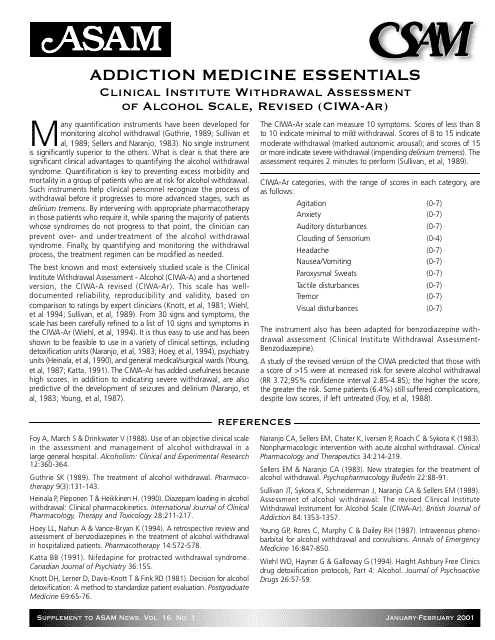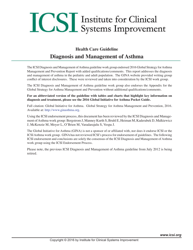Clinical Institute Withdrawal Assessment of Alcohol Scale, Revised (Ciwa-Ar)
The Clinical Institute Withdrawal Assessment of Alcohol Scale, Revised (CIWA-Ar) is a document or tool used by healthcare professionals to measure the severity of alcohol withdrawal symptoms. It assesses ten different withdrawal symptoms, including nausea, tremor, agitation, orientation, and auditory disturbances. The information obtained through this scales helps in making decisions about treatment, including medication dosages and the need for hospitalization. It is an important tool in the field of substance abuse treatment and aids in providing effective and safe care for individuals suffering from alcohol withdrawal.
The Clinical Institute Withdrawal Assessment of Alcohol Scale, Revised (CIWA-Ar) is typically filed by healthcare professionals such as doctors, nurses, and medical practitioners. The CIWA-Ar is an assessment tool used in a clinical setting to measure the severity of alcohol withdrawal symptoms in patients who are undergoing alcohol detoxification or treatment. It's not a document filed by countries but a clinical tool used in medical practice.
FAQ
Q: What is the Clinical Institute Withdrawal Assessment of Alcohol Scale, Revised (CIWA-Ar)?
A: The Clinical Institute Withdrawal Assessment of Alcohol Scale, Revised (CIWA-Ar), is a standardized tool in the field of medicine. It helps health professionals assess and monitor withdrawal symptoms in patients who are trying to stop or reduce their alcohol consumption. The scale evaluates ten measures of withdrawal symptoms, including nausea, tremor, sweating, and anxiety, among others.
Q: How does the CIWA-Ar scale work?
A: The CIWA-Ar scale uses a series of questions to rate the severity of ten alcohol withdrawal symptoms, ranging from midterm of 0-7 or 0-9, depending on the symptom. Each symptom's severity is rated, and the scores are added together for a total score. A lower score indicates less severe withdrawal symptoms, while a higher score may indicate a need for medication or other interventions to manage the withdrawal safely.
Q: Who uses the CIWA-Ar scale?
A: The CIWA-Ar scale is primarily used by healthcare professionals, including doctors, nurses, and therapists, who deal with patients experiencing alcohol withdrawal. It is an invaluable tool in health and addiction centers, hospitals, and outpatient clinics.
Q: What is the origin of the CIWA-Ar scale?
A: The original CIWA scale was introduced in the 1980s by the Clinical Institute of the Addiction Research Foundation, now known as the Centre for Addiction and Mental Health in Canada. The revised version, known as the CIWA-Ar, was later developed to improve the original scale's sensitivity and specificity.
Q: What do the scores on the CIWA-Ar scale mean?
A: The total CIWA-Ar score can range from 0 to 67, with higher scores indicating more severe withdrawal symptoms. Generally, a score lower than 8-10 suggests mild withdrawal, while a score between 10 and 20 indicate moderate withdrawal. Scores above 20 are considered severe and could suggest delirium tremens, a life-threatening condition. However, actual interpretation may vary by the treating health professional's judgement.
Q: Is the CIWA-Ar used worldwide?
A: Yes, the CIWA-Ar is a globally accepted scale used across many countries, including the USA, Canada, India, Australia, and beyond. It's a standard tool for assessing alcohol withdrawal symptoms in both research and clinical settings.





